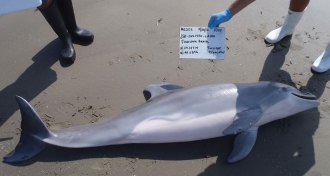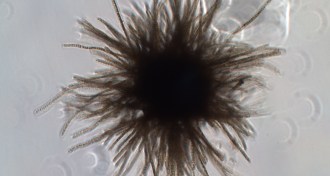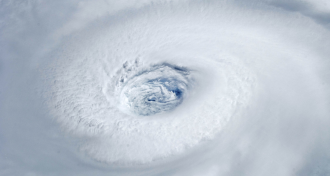Oceans
-
 Environment
EnvironmentRising dolphin deaths linked to Deepwater Horizon spill
Lung lesions and other injuries link an extensive die-off of dolphins in the Gulf of Mexico to the 2010 Deepwater Horizon oil spill.
By Beth Mole -
 Oceans
OceansMysterious form of phosphorus explained
Mysterious form of phosphorus may be used as shadow currency by marine microbes, potentially upending scientists’ understanding of nutrient exchanges.
By Beth Mole -
 Animals
AnimalsAn island in the Maldives is made of parrotfish poop
Coral-eating parrotfish create much of the sediment that a reef island is made of, a new study finds.
-
 Climate
ClimateRate of atmospheric carbon dioxide rise unprecedented
The current rate of carbon dioxide entering the atmosphere is unprecedented over at least the last 66 million years, new research shows.
-
 Animals
AnimalsLazy sunfish are actually active predators
Ocean sunfish were once thought to be drifting eaters of jellyfish. But they’re not, new research shows.
-
 Animals
AnimalsGrowth of mining on land may promote invasions at sea
Ballast water taken in to keep ships stable could, when discharged elsewhere, release species that become invasive in their new homes.
-
 Climate
ClimateOnshore hurricanes in a slump
No major hurricanes have made landfall in the United States for over nine years. That’s a rare occurrence, new research shows.
-
 Animals
AnimalsTiny sea turtles are swimmers, not drifters
Young green and Kemp’s ridley sea turtles moved in different directions than instruments set adrift in the sea, which shows the animals were swimming.
-
 Oceans
OceansUV light reveals hidden patterns on seashell fossils
Under UV light, fossil seashell color patterns glow, a researcher finds.
-
 Environment
EnvironmentFive years on, Deepwater Horizon oil spill’s impact lingers
Five years after the Gulf of Mexico’s largest disaster, researchers are still studying its ecological impact and struggling to learn the fate of most of the spilled oil.
By Beth Mole -
 Climate
ClimateRain slows whipping hurricane winds
Taking raindrop drag into account — which may slow hurricane winds by as much as 30 percent — could help improve hurricane forecasts.
-
 Oceans
Oceans‘Ocean Worlds’ chronicles the story of water on Earth and across the cosmos
Jan Zalasiewicz and Mark Williams recount the history and predict the future of Earth’s oceans.